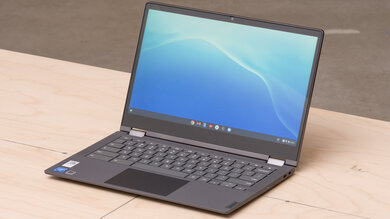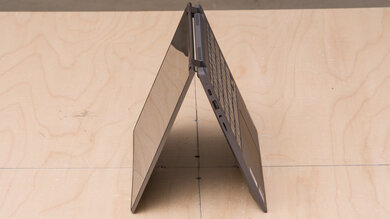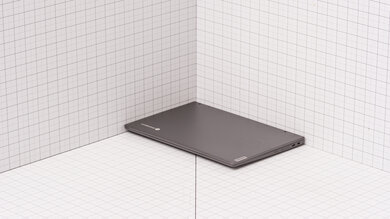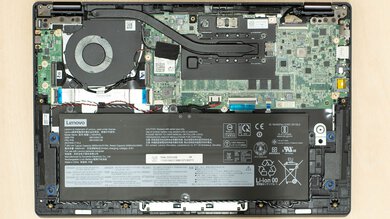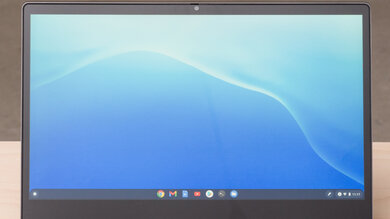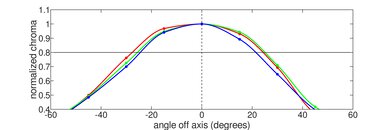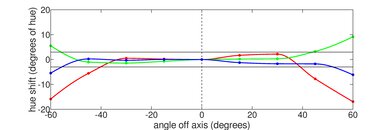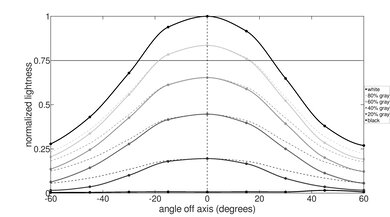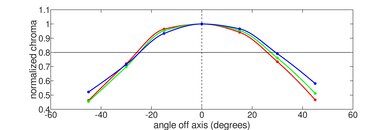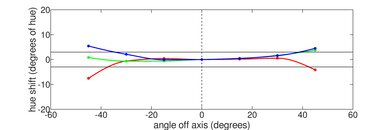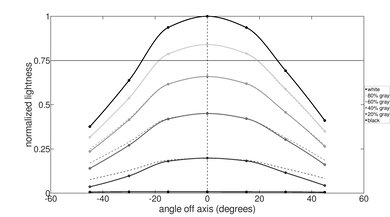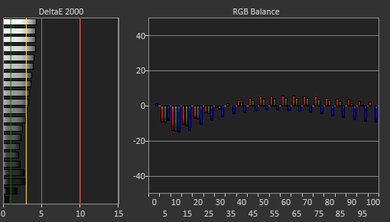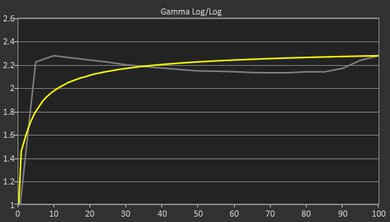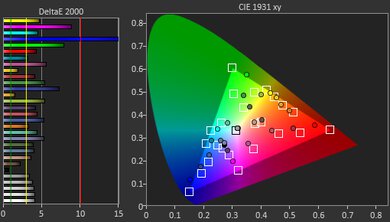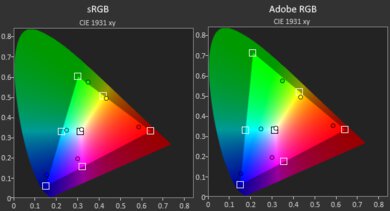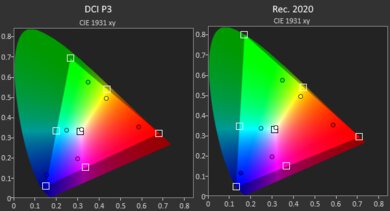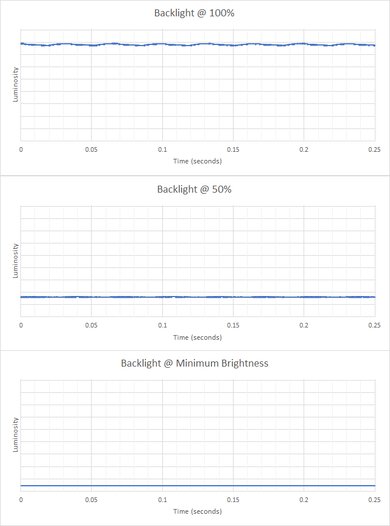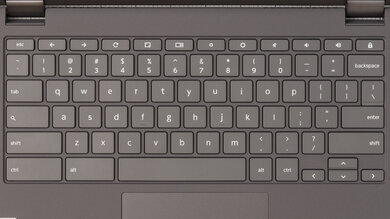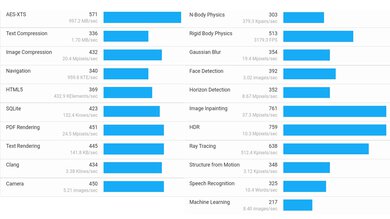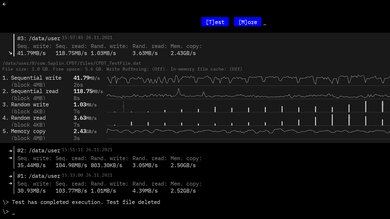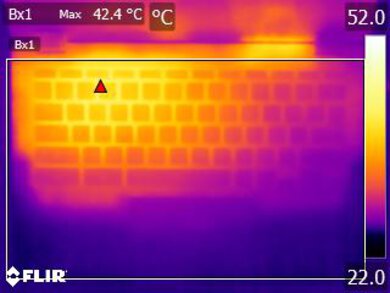The Lenovo Chromebook Flex 5 (2020) is a very well-built Chrome OS convertible with a 360-degree hinge. It's very lightweight and compact, so you can easily bring it around to do work on the go. The keyboard feels good to type on, with a good amount of travel, and it doesn't cause fatigue. Its 1080p screen displays crisp images and text, but sadly, it doesn't get bright enough to overcome reflections and looks washed out due to its narrow color gamut. Unfortunately, its speakers get loud but don't sound very good, the webcam loses out on fine details, and the microphone is staticky and records hollow-sounding speech. The port selection is sub-par, with no option to output to an external monitor, while the battery doesn't last long enough to get through a full workday. It's only available with power-efficient Intel CPUs, which perform fine for light productivity tasks and video playback but stutter if you have lots of browser tabs open. Neither CPU option is suited for heavy workloads like physics simulations and 3D renders.
We tested the Lenovo Chromebook Flex 5 with an Intel Celeron 5205U CPU, integrated Intel UHD Graphics 620, 4GB of RAM, and 32GB of eMMC storage. There are variants with an intel Core i3-10110U CPU, which are better for medium multitasking and won't lag as much as the Celeron 5205U variants. Models equipped with the 128GB NVMe SSD will run smoother overall.
Our Verdict
The Lenovo Chromebook Flex 5 is alright for school use. It's lightweight and portable enough to easily stow in a small bag, and since it's sturdy, you don't need to worry about it getting jostled around. It has a good keyboard that feels nice to type on and doesn't cause fatigue over long periods, and the battery lasts a little over seven hours of light productivity. Unfortunately, the touchpad's tracking is only alright, and the webcam and microphone don't provide the best quality for online classes. Additionally, the screen doesn't get very bright, so you can't use the laptop to work outdoors in broad daylight.
- Great build quality, with no flex when closed.
- Lightweight and portable enough to stow in a small bag.
- Battery lasts a little over seven hours of light productivity.
- Keyboard feels good to type on, and doesn't cause fatigue.
- Webcam is only alright, losing out on fine details.
- Static in microphone, and voices sound thin.
- Screen doesn't get very bright.
- Touchpad tracking quality is only okay overall.
The Lenovo Chromebook Flex 5 performs poorly for gaming. Since it's a Chrome OS device, it can't run DirectX games like Destiny 2 or Apex Legends. It's best suited for playing Google Play Store games and Linux games, but since there aren't any variants with a dedicated GPU, it can't run graphically demanding games smoothly. Also, the screen maxes out at 60Hz, and there's no VRR support, but this is typical of most Chromebooks. On the bright side, it remains quiet and doesn't get too hot under load.
- Stays quiet and relatively cool under load.
- Badly performing Intel Celeron CPU.
- Can't run DirectX games.
- No VRR support.
- No replaceable parts.
The Lenovo Chromebook Flex 5 is an unremarkable laptop for watching media. Its glossy screen doesn't get bright enough to overcome direct reflections, and it looks washed out, making content look dull. Additionally, the battery can't make it through two feature-length films before it needs to be plugged in. Although the speakers get decently loud, they still sound disappointing overall. On the bright side, you can flip the screen all the way around to use the laptop in tablet mode, and it's easy to carry around since it's very lightweight.
- Sharp 1080p display.
- Screen supports touch input.
- Lightweight and easy to carry around.
- Can be converted to tablet mode.
- Screen doesn't get very bright.
- Narrow color gamut makes screen look washed out.
- Speakers don't sound very good.
- Battery doesn't get through two feature-length films.
The Lenovo Chromebook Flex 5 performs terribly as a workstation. The port selection is disappointing, with no option to output to an external monitor, and you'll likely need to use a dongle or hub for multiple wired peripherals. Neither the Intel Celeron nor the Core i3 models are well suited for demanding workloads like 3D modeling or physics simulations, and the eMMC drive in our unit is awfully slow. However, you can get it with a significantly faster SSD that will boot the laptop, launch apps, and transfer files very quickly. If you decide to use it for workstation tasks, it fortunately doesn't get hot or loud under load.
- Stays quiet and relatively cool under load.
- Can be equipped with a significantly faster SSD.
- Badly performing Intel Celeron CPU.
- Incompatible with x86 applications.
- No replaceable parts.
- Sub-par port selection.
The Lenovo Chromebook Flex 5 is a mediocre business laptop. Its battery doesn't last a full workday, so you need to bring along its USB-C power adapter. Its port selection is sub-par, with no support for video output, and you'll likely need to use a dongle or USB hub for multiple wired peripherals. Also, the webcam and microphone are only okay, meaning you won't look or sound your best during business meetings. On the bright side, it's easy to bring around in a small laptop bag since it's lightweight and compact, and its build quality is great. The keyboard feels good to type on and doesn't cause fatigue over long periods. Although the Intel Celeron variants are fine for light productivity tasks, you'll get a smoother experience with the Core i3 models if you need to multitask often.
- Great build quality, with no flex when closed.
- Keyboard feels good to type on, and doesn't cause fatigue.
- Can be equipped with a significantly faster SSD.
- Fan is very quiet even under load.
- Webcam is only alright, losing out on fine details.
- Static in microphone, and voices sound thin.
- Sub-par port selection.
- No serviceable parts.
Changelog
- Updated Oct 27, 2023: Added mention of the Lenovo IdeaPad Slim 3i Chromebook 14 (2023) as an alternative with longer battery life in the Battery section.
- Updated Dec 08, 2021: Review published.
- Updated Dec 02, 2021: Early access published.
- Updated Nov 17, 2021: Our testers have started testing this product.
Differences Between Sizes And Variants
We tested the Lenovo Chromebook Flex 5 13 with a 13.3" display, an Intel Celeron 5205U, integrated Intel UHD Graphics 620, 4GB RAM, and 32GB of storage in the Graphite Gray color scheme. Only the CPU, RAM, and storage are configurable. It's also known as the IdeaPad Flex 5 CB at some retailers as it's closely related to the Lenovo IdeaPad Flex 5 14 (2020). There are newer variants that use a different color scheme and newer 11th Gen Intel processors, but we consider those as entirely different models. To avoid confusion, our review is only applicable to variants with a model number starting with "82B8".
| Screen |
|
|---|---|
| CPU |
|
| GPU |
|
| RAM |
|
| Storage |
|
| Color |
|
Our display and performance results are only valid for the configuration we tested. If you come across a different configuration not listed above, or you have a similar Chromebook Flex 5 that doesn't correspond to our review, let us know, and we'll update it. Some tests, like black uniformity and color accuracy, may vary between units.
You can see our unit's label here.
Popular Laptop Comparisons
The Acer Chromebook Spin 713 (2020) and the Lenovo Chromebook Flex 5 (2020) are both Chrome OS convertibles with 360-degree hinges that you can use in tablet mode, but the Acer is the much better laptop overall. The Acer has a much sharper, brighter, more color-accurate display, much better-sounding speakers, and a backlit keyboard. Also, the Acer's battery lasts significantly longer, it can output to an external display, and you can get it with much faster CPUs, more RAM, and a larger SSD. On the other hand, it's easier to take the Lenovo around with you since it's lighter and more compact.
The Lenovo Chromebook Flex 5 (2020) and the HP Chromebook x360 12 (2021) are Chrome OS convertibles with 360-degree hinges that you can use in tablet mode. The Lenovo is better for school and business use, with much better build quality, a sharper, more color-accurate 16:9 screen, and a much better keyboard. Also, you can equip the Lenovo with a faster Intel Core i3 processor and NVMe SSD. On the other hand, the HP's taller 3:2 screen gives you more vertical screen space, so you don't have to scroll as much, and its speakers sound significantly better. Also, the HP can output to an external monitor, making it a better choice if you need more screen real estate.
The Lenovo Chromebook Flex 5 (2020) and the Acer Chromebook Spin 311 (2021) are 2-in-1 devices with 360-degree hinges that run Chrome OS. The Acer is better for school and multimedia use, with a much lighter frame and a significantly longer-lasting battery. Also, its speakers sound much better, it doesn't get nearly as hot, and it stays completely silent under load. On the other hand, the Lenovo is better for business use, as it has an extra USB-C port, a sharper screen, and a much better-quality webcam and microphone. Also, you can get it with a much faster and more responsive Intel Core i3 CPU, but sadly, it can't output to an external display.
The HP ENVY x360 13 (2020) and the Lenovo Chromebook Flex 5 (2020) are both 2-in-1 devices with 360-degree hinges, but the HP runs Windows, while the Lenovo runs Chrome OS. The HP is a much better laptop overall, as its screen gets exceptionally bright, its keyboard is backlit, the touchpad tracks and recognizes gestures better, and the battery lasts significantly longer. Also, it's much more compact but has a significantly better port selection, including Thunderbolt 4, and you can get it with a variety of Intel and AMD CPUs, more RAM, and faster, larger SSDs. On the other hand, the Lenovo has a much better-quality webcam and microphone that's better for online classes and video conferences, but sadly, it can't output to an external display.
Test Results

The Lenovo Chromebook Flex 5 13 has a simple, sleek-looking design that doesn't stand out in an office setting. It's available in one color scheme, called Graphite Gray, with an entirely dark gray plastic construction. There are speaker grilles on either side of the keyboard and exhausts on the bottom and the back.
The Lenovo Chromebook Flex 5 feels very well built. Although it's made entirely of plastic, there isn't any flex in the chassis when the laptop is closed, and only a little bit of give on the keyboard deck and screen when open. You can very slightly scratch the keyboard deck with your fingernails, but the scratches are only visible when viewed at an angle.
The Lenovo Chromebook Flex 5 has a passable hinge. The screen flips all the way around so you can use the laptop in tablet mode, which is helpful for situations that don't require the keyboard, like watching videos. The hinge feels smooth when opening and closing, and there's enough resistance so that the screen doesn't wobble. However, the laptop is too light, so the keyboard deck lifts when you open the screen with one finger. The power button and volume rocker are on the laptop's right edge, so you can operate them while in tablet mode.
You can very easily take the Lenovo Chromebook Flex 5 13 around with you in a laptop bag since it's very lightweight and compact. The charger is also very easy to bring around.
The Lenovo Chromebook Flex 5 13 has poor serviceability overall. It's easy to access the internals, requiring you to remove 9 Phillips head screws before prying the plastic bottom panel off with a thin tool like a guitar pick. All the parts are easily accessible, but with that said, the RAM and storage aren't upgradeable, and we don't expect users to need to replace the battery over the usable life of the laptop. Opening the laptop and making changes to the hardware may void the manufacturer's warranty.
The Lenovo Chromebook Flex 5 13's 1080p screen is relatively small, so text and images look very sharp due to its high pixel density. Its typical 16:9 resolution means most online videos will fill up the entire screen without the presence of black bars on the top, bottom, or sides. The bezels on the top and sides are thin and aren't distracting when watching media, although the bottom chin is noticeably thicker.
The Lenovo Chromebook Flex 5 is fixed at a standard 60Hz refresh rate and isn't compatible with any VRR technology, but this is expected of most Chromebooks. There's visible ghosting in our motion blur photo, meaning that it isn't ideal for viewing fast-moving content like sports or games.
The Lenovo Chromebook Flex 5 has a decent contrast ratio typical of most IPS panels, meaning that blacks look gray when viewed in the dark. If you want a laptop with a higher-contrast display, the Lenovo Chromebook Duet 5 (2021) has an OLED panel that delivers much deeper blacks. The contrast ratio can vary between units.
The Lenovo Chromebook Flex 5 has a sub-par maximum brightness that isn't enough to overcome glare in bright environments. It also isn't suitable for use outdoors. Fortunately, it gets very dim at the lowest setting for comfortable use in dark surroundings.
The Lenovo Chromebook Flex 5 has passable reflection handling. Its glossy screen means that direct reflections like bright light sources or windows are the main concern, as the screen doesn't get bright enough to overcome them.
The Lenovo Chromebook Flex 5 has passable horizontal viewing angles. The screen washes out and gets dim if you look at it too off-center, so you have to be relatively straight on to get the best picture quality. In our hue graph, there's a sharp red level drop-off towards the right, but it isn't noticeable in practice and won't impact your day-to-day use.
The Lenovo Chromebook Flex 5's vertical viewing angles are alright. As with the horizontal viewing angles, the image dims and washes out if you look at it too off-center, but you still have a bit of leeway before the image appears too inaccurate. This gives you some freedom to tilt the screen while still keeping the picture quality acceptable.
The Lenovo Chromebook Flex 5 has passable color accuracy. The display's color temperature is warmer than our 6500K target, giving scenes a slightly orange-tinted hue. Most colors are inaccurate due to the screen's narrow gamut, but the deepest blues and greens are particularly inaccurate and lie outside the sRGB color space. Additionally, the gamma doesn't follow the curve very well, with darker scenes being too dark and brighter scenes being a little too bright. Color accuracy may vary between units.
The Lenovo Chromebook Flex 5 has a poor color gamut. It doesn't have full sRGB coverage, the color space used in the vast majority of media on the web, so most content looks washed out. Its coverage of the Adobe RGB, DCI P3, and Rec. 2020 gamuts are even worse, so it isn't suitable for creative professionals or people looking for a good HDR experience.
The Lenovo Chromebook Flex 5 13 has an acceptable keyboard overall. The material of the keycaps feels only okay, and the stability of the keys is alright, but on the bright side, the spacing between keys is good, so it takes no time at all to get used to. The keyboard feels comfortable and isn't fatiguing to type on as there's a good amount of key travel, and you only need a moderate amount of force to actuate the keys. Sadly, the lack of backlighting can cause difficulty when using the laptop in a dark environment.
The Lenovo Chromebook Flex 5 13's touchpad is only alright. It's adequately sized, with fair palm rejection and satisfactory gesture detection, but the tracking is just okay and isn't the most accurate. The click occasionally gets dropped when dragging and dropping, which can be a headache when copying over lots of text or files. Also, you can only actuate a click on the bottom half.
The Lenovo Chromebook Flex 5's speakers sound disappointing. The maximum volume is alright, and there's almost zero compression, but the high standard error means that content sounds different from the way it's meant to sound. Also, the bumps in the low and mid-treble range can overaccentuate vocals and sharp hissing sounds, respectively. The speakers lack bass, but that's expected of most laptop speakers. Since they fire upwards from the keyboard, content sounds a little muffled if you flip the screen all the way around to use in tablet mode.
The Lenovo Chromebook Flex 5 13 has a decent webcam and microphone. The webcam is alright and captures accurate, natural-looking colors, but the image is slightly overexposed. Also, details like the rope and knitting are barely visible, while finer details like strands of hair are completely lost. There's noticeable static and background noise in the microphone recording, and voices don't sound full-bodied. There's a privacy slider that physically covers the webcam. However, since it doesn't disable the webcam at the software level, the microphone can still record audio.
The Lenovo Chromebook Flex 5 13 has a middling selection of ports. All the USB ports support USB 3.2 Gen 1 (up to 5Gbps data transfer speed). You can only charge the laptop using the left USB-C port, but all three support USB Power Delivery, which lets you charge devices faster than a normal USB port. You'll likely need a USB-C dongle or hub if you have to use multiple wired peripherals. Unfortunately, you can't output to an external monitor, which severely limits your options if you need more screen real estate to work. There's a spot for a Kensington security lock on the right side, along with a volume rocker and the power button.
The Lenovo Chromebook Flex 5's wireless adapter is an Intel Wi-Fi 6 AX201NGW.
The Lenovo Chromebook Flex 5 is available with either the Intel Celeron 5205U or the Intel Core i3-10110U CPU. The Celeron is a dual-core processor that maxes out at 1.9GHz, with no support for Intel Turbo Boost or Hyper-Threading, so it's only capable of handling light workloads like video playback or web browsing. On the other hand, the i3-10110U is a dual-core processor with Turbo Boost and Hyper-Threading, so it's better suited for heavier multitasking workloads and performance-oriented applications. The Core i3 also has a larger cache memory, resulting in a more responsive system as the CPU doesn't need to fetch data from the RAM as often.
Both variants of the Lenovo Chromebook Flex 5 use Intel UHD Graphics 620. This integrated graphics unit can handle most games in the Google Play Store but has a hard time running graphically demanding titles.
The Lenovo Chromebook Flex 5 comes with 4GB of RAM. While it doesn't sound like much, it's enough for most uses on Chrome OS because of the operating system's lightweight nature. Variants equipped with the Celeron CPU use 2400MHz memory, whereas the Core i3 variants use faster 2667MHz memory. However, the performance increase in the i3 variants is due more to the upgraded CPU than the RAM. In any case, you can still experience stutters if you open up many browser tabs or applications simultaneously.
The Lenovo Chromebook Flex 5 can be equipped with 32GB or 64GB of eMMC storage or a significantly faster 128GB NVMe SSD. If you need to install lots of apps or keep media files in local storage, it's better to opt for larger storage sizes, as Chrome OS takes up almost half of the smallest 32GB storage option. Alternatively, you can expand the storage using a microSD card.
The Lenovo Chromebook Flex 5 with the Intel Celeron 5205U CPU performs terribly in the Geekbench benchmarks, as expected for a power-efficient, dual-core CPU without multithreading support. Its poor single-thread and awful multi-thread performance mean the laptop is best used with one application at a time, and heavy multitasking will result in stutters. The Intel Core i3-10110U variants will perform much better when multitasking and running foreground tasks thanks to the much faster CPU clock speed and support for Intel Hyper-Threading, so we suggest you opt for those models if you're concerned about performance.
We can't run the GPU compute test because Geekbench doesn't support the proper graphics API. However, we don't expect the integrated Intel UHD Graphics 620 to perform well in computational workloads, regardless of the processor.
Cinebench isn't compatible with Chrome OS or Linux.
The Lenovo Chromebook Flex 5 equipped with the Intel Celeron 5205U takes nearly an hour to render the relatively simple bmw27 scene, so it isn't suitable for use by enthusiasts or professionals working with 3D renders. The Intel Core i3 variants will perform much better, but we still don't expect them to render scenes quickly enough to be helpful in any professional setting.
To perform this test, we used the Linux version of Blender and ran it in a container. We can't run the GPU render test because the Linux version of Blender doesn't support the proper API, but we don't expect the integrated graphics to perform any better, regardless of the CPU.
The Lenovo Chromebook Flex 5 with the Intel Celeron 5205U has awful performance in the Basemark GPU benchmark. It performs alright in most games from the Google Play Store but doesn't perform well in graphically intensive titles. We expect the Core i3 models to perform better in games with lots of physics involved, but not any better than the Celeron models in graphically intensive games.
The Lenovo Chromebook Flex 5 with the 32GB eMMC storage drive has awful performance overall, with write speeds being particularly terrible. This means that installing apps and transferring files will be slower compared to booting the laptop and launching applications. Variants with the 128GB SSD will perform significantly better on paper, but the difference in day-to-day use won't be drastic.
The Lenovo Chromebook Flex 5 has mediocre battery life. It doesn't quite last a full 8-hour workday, so you need to bring the charger if you expect to get a lot of work done away from home. The battery drains much quicker when playing back video, so you can't get through many feature-length films or TV show episodes. If you want a Chromebook with longer battery life, check out the Lenovo IdeaPad Slim 3i Chromebook 14 (2023).
Borderlands 3 isn't compatible with Chrome OS or Linux.
Civilization VI isn't compatible with Chrome OS or Linux.
CS:GO isn't compatible with Chrome OS. Even if you run the Linux version in a container, we don't expect the CPU and integrated graphics to provide a smooth gaming experience.
Shadow of the Tomb Raider isn't compatible with Chrome OS. We don't expect the laptop to be able to run the Linux version, either.
The Lenovo Chromebook Flex 5 has great thermal and noise handling. At idle, it feels warm around the upper left-hand side of the keyboard, but it doesn't get too much hotter while under load. The fan is barely audible while idle or running demanding tasks, which is helpful if you need to work in noise-sensitive environments like classrooms. If you want a Chrome OS device that's fanless and completely silent, check out the HP Chromebook x360 14 (2021).
Cinebench R23 and UNIGINE Heaven aren't compatible with Chrome OS, so we couldn't test if the Lenovo Chromebook Flex 5 loses performance over time while under load. However, the Intel Celeron CPU in our model is relatively low power, so we don't expect it to throttle. On the other hand, we expect variants with the Intel Core i3 to see a slight performance decrease over time.
The Lenovo Chromebook Flex 5 runs Chrome OS, a Linux-based operating system with its main features built around the Google Chrome browser and Play Store apps. You can also run Linux apps in a container. However, it isn't compatible with x86 applications, meaning you can't run programs like the Adobe Suite. Otherwise, there isn't any other software aside from what Chrome OS is natively bundled with.
Every Chromebook has an "expiration date" at which it stops receiving software updates, and according to Google's official document, the end-of-life of the Lenovo Chromebook Flex 5 is June 2028. Google may extend this date as they have in the past for other Chromebooks; it's best to check their official document for any changes.

